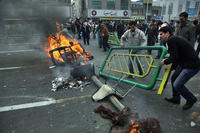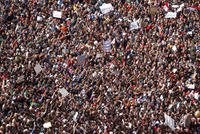-
U.S. and Turkey meet to expand counter-terrorism partnership
Last week DHS secretary Janet Napolitano met with Turkey’s state minister Hayat Yazici to strengthen ties between the two countries and increase coordination to combat terrorism; Turkey is a critical ally in the Middle East and has worked closely with the United States in Iraq and Afghanistan; last month, Turkey arrested a wanted Saudi terrorism suspect who was on the Saudi Interior Ministry’s list of eight five most wanted terrorists; the meeting comes as Napolitano is working with her European counterparts to secure the global supply chain, prevent terrorists from exploiting it, and protect its critical infrastructure; Turkey has worked closely with the United States on Project Global Shield, an international effort to interdict shipments of dangerous chemicals used in improvised explosive devices (IEDs)
-
-
PATRIOT Act extended by nine months

In a move last Tuesday which surprised the Republican leadership in Congress, 26 Republicans — seven of them freshmen — voted against the extension of the PATRIOT Act, which expires 28 February; the measure was defeated when the Republican leadership attempted to force it through a fast-track procedure that required a two-thirds majority, but the vote — 277 for and 148 against — fell short; the House last night, in 275 to 144 vote under regular procedure, extended the Act by nine month; the extension includes special “roving” wiretaps, which allow law enforcement officials to use one search warrant to monitor a suspect’s calls, even if he or she skips from phone to phone; traditional search warrants only apply to a single telephone line; the Senate is yet to act on the bill
-
-
Study shows more non-Muslim terrorists in U.S.
A new report found that the number of American Muslims involved in terrorist acts dropped by more than half compared to 2009; in 2010 twenty American Muslims were arrested for terrorism, down from 2009’s peak of forty-seven; in 2010 there were more than twenty plots by non-Muslims compared to the ten Muslim Americans arrested for domestic plots; the report supports the argument that fears of domestic radicalization are exaggerated, and was released after the American woman calling herself “Jihad Jane” pled guilty to recruiting terrorists to kill a Swedish cartoonist; Representative Peter King is preparing for domestic radicalization hearings in the House’s Homeland Security committee
-
-
Iran faces anti-government protests Monday

Opposition groups in Iran are calling for massive demonstrations on Monday; the Iranian government, which brutally suppressed anti-government demonstrations following the disputed 2009 elections, vowed to stifle the opposition and not allow the demonstrations to take place; Reza Pahlavi, the eldest son of the last shah of Iran who was deposed in the 1979 revolution, said that the outcome in Egypt must be “emboldening” for his country; U.S. National Security Adviser Tom Donilon said: “By announcing that they will not allow opposition protests, the Iranian government has declared illegal for Iranians what it claimed was noble for Egyptians”
-
-
Lawmakers urge DHS to use profiling to detect terrorists
Republican lawmakers criticized DHS secretary Janet Napolitano for not focusing more on Islamic extremism and that “political correctness” was hindering her department’s ability to keep the United States safe; at a House Intelligence Committee hearing, Representative Paul Broun (R-Georgia) attacked Napolitano for not acknowledging Islamic extremism as the source of the current terrorist threat and urged DHS to use racial profiling in screening passengers at airports; Napolitano defended DHS efforts by saying threats emanated from more than just the Muslim community; a recent report found that last year twice as many plots to attack the United States were planned by non-Muslims than Muslims; the director of the National Counterterrorism Center said that focusing solely on one group could alienate them and exacerbate the problem
-
-
The third way in Egypt
The dilemma the United States is facing in Egypt is often compared with the one encountered by the United States during the Iranian Revolution of 1979; pundits argue that the alternative in Egypt is between a corrupt but pro-Western dictatorship and a repressive religious autocracy; in the United States, worries have been expressed that the post-Mubarak transitional government, led by an intellectual or secular leader such el Baradei, will be vanquished in favor of Islamic autocracy as was the case with Shapur Bakhtiar, the last secular prime minister of Iran; this comparison misstates the history and presents a false choice
-
-
Yemeni cleric al Awlaki is greatest threat to U.S.
Michael E. Leiter, the director of the National Counterterrorism Center, told the House Homeland Security Committee that the mastermind behind al Qaeda in the Arabian Peninsula (AQAP) was the greatest threat to the United States; Anwar al Awlaki, the head of AQAP, is a dual U.S.—Yemeni citizen and has been linked to several attacks on the United States including the failed Christmas Day 2009 attack, the Fort Hood shootings, and the failed car bomb in Times Square, New York; counter-terrorism officials are particularly worried about al Awlaki because he is one of a few English-speaking radical clerics who can connect to young Muslims in America
-
-
U.S. communities support surveillance systems
Despite calls by the ACLU to halt the expansion of the use of CCTVs in public places, towns across the United States are eager to get their hands on the extra sets of eyes; midsized communities across the United States are installing more surveillance video cameras in an effort to cut down on crime, without having to spend more money on additional law enforcement officials
-
-
U.K. plans new body for the regulation of nuclear power
The United Kingdom is setting up a new nuclear regulatory body; the Office for Nuclear Regulation (ONR) would be a new independent regulator, formally responsible in law for delivering its regulatory functions and consolidating civil nuclear and radioactive transport safety and security regulation in one entity
-
-
Mubarak cedes authority to Suleiman, but remains in office

Egyptian president Hosni Mubarak said Thursday he has passed authority to Vice President Omar Suleiman, but will not step down before September elections; the move, announced in a nationally televised address, means he will retain his title of president and ensures the regime will continue to control the reform process; it is not clear whether the anti-government protesters would accept Mubarak’s plan; Suleiman has led the regime’s management of the crisis since he was named to the vice president post soon after protests erupted on 25 January; with his efforts failing to bring an end to protests, he and his foreign minister both warned of the possibility of a coup and imposition of martial law if the protesters do not agree to a government-directed framework of negotiations for reforms
-
-
Governing post-Mubarak Egypt
The end of Mubarak’s reign and the likely reforms of Egypt’s political system make for an unpredictable, nervous period; in 2005 the Muslim Brotherhood won 88 seats in parliament, or about 20 percent; the leadership of the MB at the time was more pragmatic and actively sought to be involved in the country’s politics; in January 2010 the leadership of the MB was changed, and a more religiously conservative, but also a more politically aloof, leaders are now at the helm; moreover, the MB historically has been the only movement to take on the regime, and as a result it has enjoyed what analysts regard as an inflated support; the demonstrations of the last two weeks show that there are many movements and groups now willing to participate in the political process; this means that Egypt’s silent majority will have alternatives to the MB at the polls; the trouble: there may be too many alternatives, risking splitting the secular vote, thus allowing the MB to emerge as one of the largest, if not the largest, party in the post-September elections parliament
-
-
275,000 visas issued to people from terror-prone countries
Nearly 275,000 entry visas to the United States have been given through 2009 to individuals from countries like Yemen, Pakistan, Somalia, Iran, and Syria — defined by the State Department as states which sponsor terrorism or in which terrorists enjoy relative free movement; it is estimated that of the 12 to 15 million undocumented aliens in the United states, between 4 and 5 million are visa overstays; DHS has only 272 agents to look for these 4 or 5 millions who disappeared after entering the United States
-
-
Arizona to vote on bill denying birthright citizenship

An Arizona bill that would put a stop to automatic U.S. citizenship for children of illegal immigrants could come to a vote next week; the state’s legislation would define a U.S. citizen as someone who has been naturalized, or someone born in this country who has at least one parent who has no allegiance to a foreign country; a group of state legislators known as the State Legislators for Legal Immigration (SLLI) is proposing legislation which would allow a state to issue two kinds of birth certificates — one to babies of people legally in the United States, and a different one to babies of illegal immigrants; SLLI says that lawmakers in as many as fourteen states plan to introduce bills on the matter this year
-
-
Bus bombing signals tough road ahead for Philippines
Al Qaeda-linked Muslim extremist group Abu Sayyaf is continuing its attacks in the Philippines; the latest attack, in Makati City, has killed five; last year, the same terrorist organization claimed responsibility for killing 116 people in a burning ferry in Manila Bay, the deadliest terrorist attack in the country’s history; lawmakers propose installing CCTVs on city buses
-
-
Lt. Col. Cabangbang flushes out Abu Sayyaf leader
Government forces killed an Abu Sayyaf leader in an encounter at a remote village in Basilan Island, southern Philippines on Tuesday; Abu Sayyaf, an Islamist separatist group founded in the 1990s with links to external terrorist organizations, has about 400 members at present
-
More headlines
The long view
Factories First: Winning the Drone War Before It Starts
Wars are won by factories before they are won on the battlefield,Martin C. Feldmann writes, noting that the United States lacks the manufacturing depth for the coming drone age. Rectifying this situation “will take far more than procurement tweaks,” Feldmann writes. “It demands a national-level, wartime-scale industrial mobilization.”
No Nation Is an Island: The Dangers of Modern U.S. Isolationism
The resurgence of isolationist sentiment in American politics is understandable but misguided. While the desire to refocus on domestic renewal is justified, retreating from the world will not bring the security, prosperity, or sovereignty that its proponents promise. On the contrary, it invites instability, diminishes U.S. influence, and erodes the democratic order the U.S. helped forge.
Fragmented by Design: USAID’s Dismantling and the Future of American Foreign Aid
The Trump administration launched an aggressive restructuring of U.S. foreign aid, effectively dismantling the United States Agency for International Development (USAID). The humanitarian and geopolitical fallout of the demise of USAID includes shuttered clinics, destroyed food aid, and China’s growing influence in the global south. This new era of American soft power will determine how, and whether, the U.S. continues to lead in global development.
Water Wars: A Historic Agreement Between Mexico and US Is Ramping Up Border Tension
As climate change drives rising temperatures and changes in rainfall, Mexico and the US are in the middle of a conflict over water, putting an additional strain on their relationship. Partly due to constant droughts, Mexico has struggled to maintain its water deliveries for much of the last 25 years, deliveries to which it is obligated by a 1944 water-sharing agreement between the two countries.
How Disastrous Was the Trump-Putin Meeting?
In Alaska, Trump got played by Putin. Therefore, Steven Pifer writes, the European leaders and Zelensky have to “diplomatically offer suggestions to walk Trump back from a position that he does not appear to understand would be bad for Ukraine, bad for Europe, and bad for American interests. And they have to do so without setting off an explosion that could disrupt U.S.-Ukrainian and U.S.-European relations—all to the delight of Putin and the Kremlin.”
How Male Grievance Fuels Radicalization and Extremist Violence
Social extremism is evolving in reach and form. While traditional racial supremacy ideologies remain, contemporary movements are now often fueled by something more personal and emotionally resonant: male grievance.
